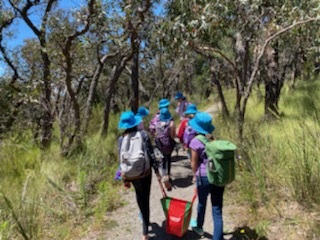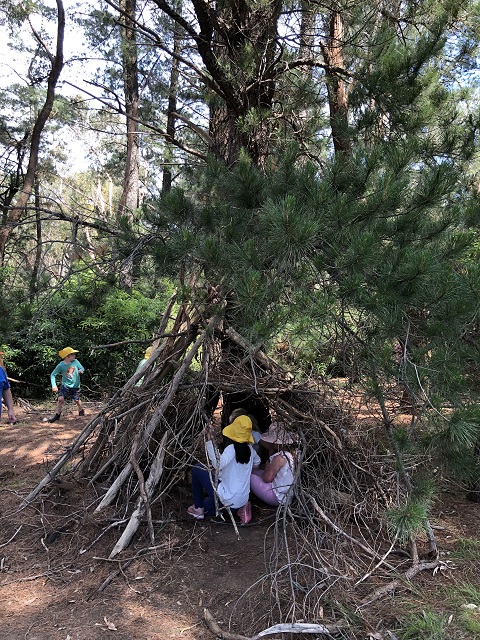Just as love and joy should permeate the surroundings of the child in the earliest years of life, so through physical exercises the growing etheric body should experience an inner feeling of its own growth, of its ever increasing strength. – Rudolf Steiner
The importance of an active, healthy lifestyle for growing children is universally accepted as imperative. However, we are becoming a world of ‘watchers’ rather than ‘doers’ and as a result, children are losing the ability to play spontaneous self-developed games. These have been replaced by television, computer games and adult-styled competitive sports. In the past (and in other cultures) traditional games and folk dancing contributed significantly to the development of co-ordination, balance and motor skills as well as promoting physical fitness, which is why they are still fostered in Steiner schools.
From the three-fold perspective, the Physical Education curriculum can be defined as:
- Physical development [Willing]
- Social development [Feeling]
- Self-development [Thinking]
Physical Development
Exercise and movement
 Plenty of opportunities for exercise and movement are provided in natural playgrounds. Nature walks, creative play and morning circle activities lead on to more structured group games, gymnastics and other activities. Movement classes run throughout the curriculum.
Plenty of opportunities for exercise and movement are provided in natural playgrounds. Nature walks, creative play and morning circle activities lead on to more structured group games, gymnastics and other activities. Movement classes run throughout the curriculum.
Nutrition
Healthy and wholesome food is given a high value in our school. Children participate in organic vegetable gardening, and preparing and sharing food together for seasonal festivals provides a strong starting-point for learning about healthy nutrition. Children are encouraged to bring only wholesome foods from home. (Please refer to the School’s Food Policy).
Safety
Our natural bush environment encourages children to be both adventurous and safety-conscious. They learn respect for school boundaries and playground rules and how to play without endangering others. In the classroom, children participate in cooking and domestic tasks, using sharp kitchen utensils and hot irons in a responsible and closely supervised environment. In craft and woodwork they learn to handle tools safely at an appropriate age. There is a water safety and swimming program and topics such as road safety and fire are addressed regularly.
Social Development
Both the curriculum and the approach to teaching emphasise the development of the emotional life of the children and their ability to participate healthily in their community. The central role of art and music fosters sensitivity and the feeling life, creating an atmosphere of ‘belonging’. (Please refer to the School’s Pastoral Care Policy).
Tolerance and Co-operation
Play and organised group activities help young children develop skills in sharing and co-operation. Morning circle work and eurythmy helps develop spatial relations and group interaction. Children are encouraged not to exclude others and to give help when needed, in an atmosphere of co-operation rather than competition. The school has an anti-bullying program and well-developed code of behaviour. (Please refer to the School’s Discipline Policy).
Up until Class 3 competitive team games are not a part of the program. Team sports begin to be introduced from Class 3 onwards. In all team games there is, by definition, an element of competition. However, the curriculum specifically focuses on the effective co-operation of the members of the team rather than on winning and losing. Apart from the Greek Olympics in Class 6, the school does not entertain any inter-school competition until at least Class 7.
Tolerance and understanding of other cultures is supported throughout the curriculum through a close examination of other cultures, including value systems, spiritual outlook and the arts.
The way the school is administered offers children a sound model of community co-operation, with teachers and staff working together through consensus in the running of the organisation. Strong parent participation in helping around the school and in school social events also provides good models of community co-operation.
Respect for Natural and Built Worlds
As well as caring for fellow humans, children are encouraged to care for animals and plants. Beautiful natural surroundings, good quality toys and buildings that reflect beauty and care in their construction show children respect for the skill and patience that go into creating their surroundings. Community participation in the building program encourages the protection and preservation of the whole school environment.
In the curriculum, animals and plants are always studied in the context of their relationship to the human being to give a picture of the inter-dependence of the human and natural worlds.

Communicating
Co-operative playground activities give children lots of practice at communicating and negotiating, with teachers on hand to mediate any conflicts peacefully and instill the arts of compromise and courtesy. Good communication in the classroom is encouraged through ‘show and tell’ in the early years, with children giving short talks and participating in debates in the older classes. (Please refer to the School’s Communication Policy).
Self Development
Developing a Strong Sense of Self
That each child is valued by the teacher for their individuality is a central tenet of the Steiner approach. A rounded curriculum which places equal emphasis on artistic, academic and physical skills facilitates this. It recognises that each person has different talents and children quickly learn to respect different abilities, which helps to develop their own sense of individuality.
Self Knowledge
The whole program from kindergarten to Class 6 is designed to help children become at home in and have confidence in their bodies, gaining control as they move through space, develop good hand-eye co-ordination and cross laterality. Main Lessons bring more specific knowledge of the human body and different cultural and religious values which all help to develop the student’s sense of place in the wider world.
Developing Judgement
Students are helped to make responsible and informed decisions regarding their own lives and the lives of others. The whole curriculum works to help children develop a reverence for all things and sound personal values. Children are helped to make healthy choices by the example of responsible adults around them and through their own growing sense of what is right, fair and healthy.
Click here to return to the Class Teacher Subjects page.

